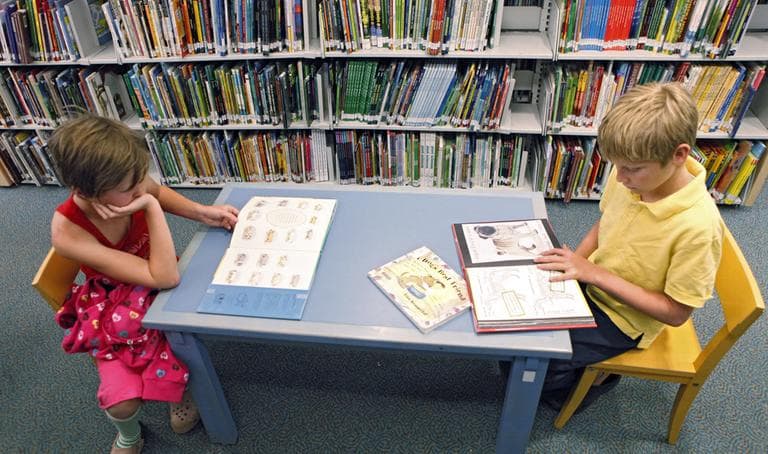Advertisement
Author Jeff Kinney Talks Pulp Fiction For Kids
Resume“Diary of a Wimpy Kid” gets kids who don’t read to read. We’ll talk with Jeff Kinney, the author, who says his bestselling books are “pulp fiction for kids.”

Once upon a time, we picture good little children on a lazy summer afternoon reading “The Wind in the Willows” or “Charlotte’s Web” or maybe “Treasure Island.” Tales of derring-do and coziness and moral uplift.
Today, the fare is rougher. Less dewey-eyed. Among the biggest-sellers: “Diary of a Wimpy Kid” by Jeff Kinney.
His middle-school boy anti-hero is like Bart Simpson in a bad mood. Vindictive, mean, lazy. And a superstar to young readers. “He gets them to read,” parents say.
This hour On Point: we talk with Wimpy Kid author Jeff Kinney and more about the arc of children’s literature.
-Tom Ashbrook
Guests:
Jeff Kinney, author of the best-selling children’s series “Diary of a Wimpy Kid”
Mary Fellows, president of the Association for Library Service to Children, a division of the American Library Association.Leiby Burnham, rabbi and associate director of the Partners in Torah program of Yeshiva Beth Yehudah in Detroit.
Show Highlights
Jeff Kinney, author and illustrator of the “Diary of a Wimpy Kid” series, on what he read as a kid:
My favorite book was Tales of a Fourth Grade Nothing by Judy Blume. I also liked Freckle Juice a whole lot, but on the tip of a sibling, I skipped “Are You There, God? It’s Me, Margaret.”
I loved those books where I could see characters who were like me. Something I like about [main character] Greg Heffley on the cover of my book is how he’s got a frown on his face. There’s a message there that this character is not perfect, and in the title, it says “Diary of a Wimpy Kid.”
I guess it’s related, in a way that maybe I didn’t understand before, to “Tales of a Fourth Grade Nothing.” Peter Hatcher was really a put-upon kid, like I felt at times in my life. I think that I gravitated to things where the characters felt authentic, and I think Judy Blume was a master at doing that.
Jeff Kinney says kids have a strong sense of when adults are moralizing to and manipulating them:
KINNEY: I saw a Washington Post article a few years ago. It said “Mother-son book club sure to be a hit.” That to me is like manna from the comic gods.TOM ASHBROOK: Because you don’t believe it?
KINNEY: [Laughing] No.I love that kind of thing. The idea that – in my books – the mother starts a “reading is fun” club, where she’s trying to introduce kids to books like Anne of Green Gables and Little Women and things like that. All the boys bring in their books – their selections – and they are Sudoku books and video game sheet guides and things like that, because that’s their idea of what makes good reading.
What’s funny about the selection Mary read [a fable from McGuffey’s Third Eclectic Reader (popular children’s literature from the 1830’s to the mid-1900’s) on “courage and cowardice”] is that you can just feel the presence of an adult. You can feel that adult is trying to be manipulative. I think that kids really pick up on that at a very, very young age.
It’s why they progress from Barney to something like Phineas & Ferb in the blink of an eye. Kids know when they’re being moralized to. If you want to be successful as an adult and moralize to kids, you need to slip it in. You can’t be so heavy-handed.
From Tom's Reading List:
- Time: "A few years ago, I was asked to speak at a conference for librarians in Brooklyn. The topic was how to reach "reluctant readers" (whom I've since come to know by the more concise term boys), and the librarian who organized the discussion, a progressive woman in her 60s, framed the issue like this: boys are interested in reading about video games and sharks, but they're being handed books like Little Women and Anne of Green Gables."
- The Washington Post: "If you believe middle school to be one of the more nightmarish times of life, then Jeff Kinney could well be considered the biggest horror writer going."
This program aired on July 19, 2011.